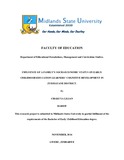Please use this identifier to cite or link to this item:
https://cris.library.msu.ac.zw//handle/11408/2284| Title: | Influence of a family’s socio-economic status on early childhood education learners’ cognitive development in Zvishavane District. | Authors: | Chakuya, Lillian | Keywords: | Early childhood education Cognitive development Socio-economic development |
Issue Date: | Nov-2016 | Publisher: | Midlands State University | Abstract: | The study sought to investigate the influence of socio-economic status on Early Childhood Education learners’ cognitive development. The study was motivated by the variance in learners’ cognitive abilities even though learners are of the same age. The researcher therefore looked at factors that influenced the learners’ cognitive development and the relationship between the learners’ socio-economic background and their cognitive development. The problem was that some pupils were lagging behind the others and if given homework they were not doing the homework, or the homework would not be correctly done. A critical literature review was done which revealed that there are various factors that affect the cognitive development of children such as poverty, low level of education from parents, parent-child interaction, lack of exposure to cognitive stimulating materials, the size of the family among other factors. The accessible population comprised of seven schools and a sample of two schools was chosen by stratified random sampling technique. This gave each school equal chances of being chosen. Ten Early Childhood Education teachers responded to questionnaires while twelve parents were interviewed. The study employed the descriptive research design. The findings revealed the children from low socio-economic backgrounds are negatively impacted which affects their cognitive development. It was therefore concluded that the parents should be educated on the importance of the cognitive development of their children, hence they should be active participants in stimulation of their cognitive development despite lack of resources. Teachers are encouraged to improvise in schools. Other factors that affect cognitive development can be tackled by other researchers. | URI: | http://hdl.handle.net/11408/2284 |
| Appears in Collections: | Bachelor of Educational Foundations and Curriculum Studies |
Files in This Item:
| File | Description | Size | Format | |
|---|---|---|---|---|
| CHAKUYA.pdf | Full text | 1.53 MB | Adobe PDF |  View/Open |
Page view(s)
126
checked on May 16, 2025
Download(s)
64
checked on May 16, 2025
Google ScholarTM
Check
Items in MSUIR are protected by copyright, with all rights reserved, unless otherwise indicated.



